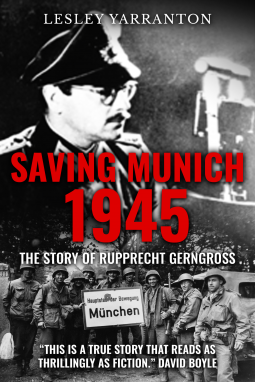
Saving Munich 1945
The story of Rupprecht Gerngross
by Lesley Yarranton
This title was previously available on NetGalley and is now archived.
Send NetGalley books directly to your Kindle or Kindle app
1
To read on a Kindle or Kindle app, please add kindle@netgalley.com as an approved email address to receive files in your Amazon account. Click here for step-by-step instructions.
2
Also find your Kindle email address within your Amazon account, and enter it here.
Pub Date 22 Aug 2020 | Archive Date 5 Oct 2020
Talking about this book? Use #SavingMunich1945 #NetGalley. More hashtag tips!
Description
April 1945. The Second World War is drawing to an end, but the fighting - and suffering - is still intense. Fanatical Nazis planned a destructive, bloody last stand in Hitler’s favourite city, Munich, the cradle of Nazism. But one man stood in their way.
Rupprecht Gerngross was a former solicitor from Munich, and student at the London School of Economics. He was known for being mild-mannered and a curious blend of courage, conscience and cunning recklessness.
It was a combination that drove him into the path of great danger - but one that he felt was necessary to achieve his dream of democracy and freedom.Towards the end of the war, he secretly transformed his unit of army translators into a fearsome fighting force, pledged to challenge the Nazis.
At extraordinary personal risk, Gerngross hatched a plan to take control of Munich - hastening the end of the war and saving the city from disaster.
By capturing the main radio station and seizing a group of key Nazis, he hoped to trigger a mass rebellion against the regime. But, for all his courage, Gerngross did not reckon with the possibility of betrayal, or the ferocity of SS troops sworn to fight to the death.
This is the untold story of an improbable hero and an uprising that became "the only successful military putsch against the Third Reich".
It tells a story that was suppressed at the time by the British Foreign Office because the Allies did not want news circulating about ‘good Germans’.
Advance Praise
"A gripping true story, which holds lessons for us today." Richard Foreman
"This is a true story that reads as thrillingly as fiction." David Boyle
"A gripping true story, which holds lessons for us today." Richard Foreman
"This is a true story that reads as thrillingly as fiction." David Boyle
Available Editions
| ISBN | 9781912119783 |
| PRICE | £2.99 (GBP) |
Links
Average rating from 10 members
Featured Reviews
 Patricia H, Reviewer
Patricia H, Reviewer
Gerngross true story was very interesting what he did for Munich. Saving Munich 1945 did so much to help so many people and save many.
I am a keen reader of books relating to World War Two and thought I knew a lot about the people who rebelled against the cruel regime, often as extreme personal cost. But I had never heard of this character and his actions. I can’t believe this story is not better known. It’s a fascinating study of bravery, intelligence and morality. The book itself is clearly very well researched and written very clearly. You would not have to be a history buff to find this an accessible and fascinating read.
 Kevin M, Reviewer
Kevin M, Reviewer
This is an unusual book, covering as it does a relatively unknown incident in WW2. The author brings together aspects of an episode that occurred during the closing days of the Second World War, when a German officer attempted to organise a peaceful surrender of the city of Munich to the advancing American armies. History has not been especially kind to the officer concerned, partly due to the Allies reluctance to acknowledge the concept of a ‘Good German’ at that time and partly because of the conflicted emotions in Germany in the aftermath of the Second World War. Although likely to be an interesting read to someone who has read extensively around the history of this period, the book covers rather more peripheral issues in depth and leaves aspects of the attempted takeover of the city rather sketchily covered. What it does illustrate in awesome clarity, however, was the Nazi regime’s preparedness to use terror on its own people to force compliance right to the bitter end, even as American armies approached the city, when the outcome was a foregone conclusion.
 DR P, Reviewer
DR P, Reviewer
German heroes of World War II....wait! What?!? Were there really such men? Indeed there were, but their story has been suppressed these many decades. I came to this slim tome immediately after reading of the atrocities committed by German soldiers against the Italian partisans - & villagers - & it has been a timely reminder that there are always two sides to every coin. Whilst there were many inhuman acts perpetrated during the War, compounded by the attitude of those who preferred to ignore what was being done (eg those who lived near the concentration camps), it comes as a relief to find there were a brave few within the ranks who disagreed & were prepared to risk their own lives to bring it to an end. They risked their all, & in many cases it did cost them everything. It is a crime that they have been (deliberately!) not recognised over all this time, & I am grateful to Lesley Yarranton for bringing this group of German heroes to our attention – also to the publishers for making their story more widely known. Most of all, to Rupprecht Gerngross : I salute you!
 Lilian Astrid G, Reviewer
Lilian Astrid G, Reviewer
They were not many, but there were some “good Germans” in Nazi-Germany, and Lesley Yarranton recounts in great detail the story of one of them. Rupprecht Gerngross from Munich, head of a unit of army translators, was one of them. Smart and brave he decided to save his city from destruction by the Allied Forces in the last days of World War II, by trying to organize a mass rebellion against the fascist regime. His idea was to capture the main radio station and to seize a number of key Nazis. Alas, not everybody was up to his plan or willing to risk his or her life. What was meant to be a successful coup failed in parts – because the US army arrived later than expected, and because there were traitors among the forces, Gerngross had assembled and inspired. However, he had tried, and would have merited more fame than what he got. Not least, because the Allies did not want to spread the news of honest and courageous Germans, who after all tried to do something against Hitler and his many supporters in a country that had lost the war already, and yet kept on fighting it. Reading this story today reminds us of the violence, the horror and the absurdity of these years of terror and murder, of genocide and fear. Yarranton writes about it in a style, which is easily accessible also to readers, who do not normally read history books or analyses of the war. The story she tells has not been told before, and there is not much information about it online, either. Apparently, there were debates about Gerngross’ contribution to the ending of the the Nazi regime or the survival of Munich. However, what matters to me is that a few men tried to offer resistance. They should not be forgotten.
 Educator 127278
Educator 127278
Thank you to Netgalley and BooksGoSocial , for the review copy.
This is an unbiased review of the author's work and style. If you want spoilers please see the publishers blurb and other reviewers' reports.
“Saving Munich 1945” by Lesley Yarranton is one of the few well researched and published accounts of the small German resistance that found its voice during the final months of the Second World War, it stands well alongside other works such as “A Woman in Berlin”.
The author’s style is reportage and very well edited. The story of the uprising of this little known homegrown German resistance organisation is paced well and fluently told. She manages to relate the level of research required to uncover the story, without the necessity of footnotes, making it part of the tale. She also highlights Munich’s civil authority's attitude post-war history showing their underlying reluctance to recognise the bravery of the group and award its members with recognition.
Five stars all the way.
 Reviewer 98309
Reviewer 98309
Saving Munich 1945: The story of Rupprecht Gerngross is an intriguing read. It gets five stars from me.
 Lisa B, Reviewer
Lisa B, Reviewer
Really enjoyed this book. I had never heard of Rupprecht Gerngross. So this was a whole new story to learn. The book was very interesting. It was very well written.
 John P, Reviewer
John P, Reviewer
This is the first publication by Lesley Yarranton. Saving Munich 1945: The story of Rupprecht Gerngross was published in 2020. It is the 55th book I completed reading in 2023.
Opinions expressed here are unbiased and entirely my own! Due to scenes of violence, I categorize this book as R. Wehrmacht Captain Rupprecht Gerngross was an interpreter assigned to Munich as the war in Europe was approaching its conclusion. He had been born in 1915 in the International Compound of Shanghi. He grew up there, returning to Germany in 1926 with his family. They took up residence in Munich and he eventually became a lawyer.
Neither he nor his family were supporters of Hitler. He was in the Wehrmacht, but not a member of the Nazi party. As Nazi Germany was steadily falling to the Allies, Hitler did not want to let German infrastructure fall into Allied hands. In particular he ordered that as much of Munich as possible be destroyed before it fell into Allied hands. Gerngross was one of the Germans that organized the resistance to this order. Fortunately, by that time Patton was only about 50 miles away. Gerngross and other resistance groups worked hard and often died to give the Allies the 48 hours needed to liberate Munich.
I enjoyed the 4.5+ hours I spent reading this 247-page WWII history. The story told is one I had not come across before. The exploits of Gerngross were lost from view in the post-war years. The chosen cover art is very appropriate for the story. I give this book a rating of 4.3 (rounded to 4) out of 5.
You can access more of my book reviews on my Blog ( https://johnpurvis.wordpress.com/blog/).
Readers who liked this book also liked:
Ervin Staub
Biographies & Memoirs, History, Nonfiction (Adult)
Alan R. Warren
Biographies & Memoirs, History, True Crime


















